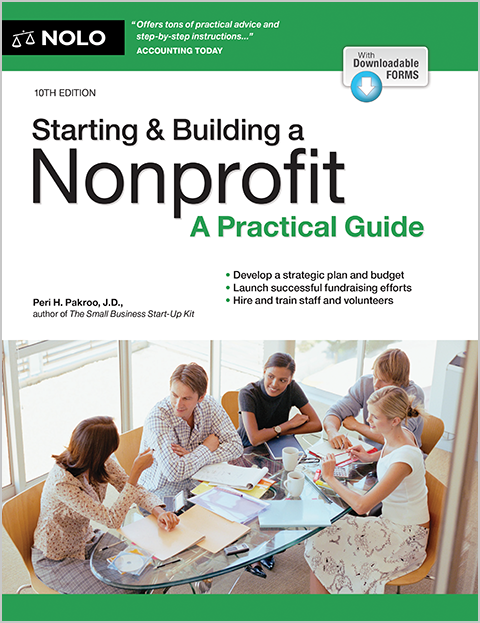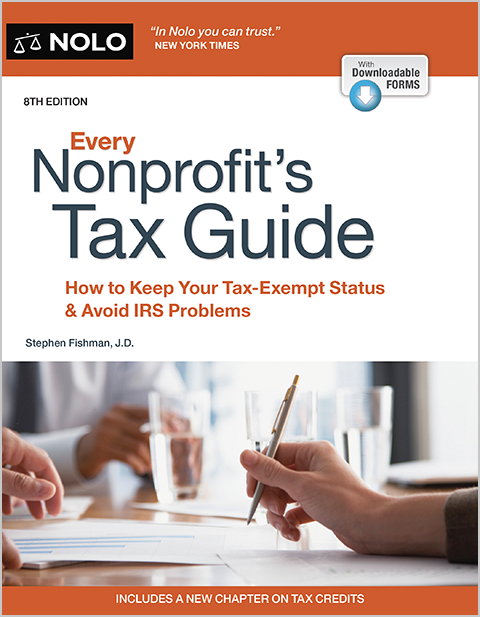If your nonprofit organization makes less than $5,000 per year, you may be able to obtain tax-exempt status from the IRS without filing a Form 1023 application.
A few types of nonprofits are in the unique (and enviable) position of being able to qualify as tax-exempt Section 501(c)(3) charitable organizations without applying to the IRS. These qualifying nonprofits include:
- very small nonprofits with annual gross receipts of less than $5,000
- churches, synagogues, temples, and mosques, and
- integrated auxiliaries of churches and conventions or associations of churches.
Donations to these organizations are tax-deductible even though the nonprofit never applied for, or obtained, a 501(c)(3) determination letter from the IRS. This automatic tax-exempt status is a huge benefit for your group because qualifying with the IRS normally involves filing a complicated tax exemption application form (Form 1023), paying filing fees, and waiting for the IRS to issue you a determination letter. (To learn more, see our article on how to obtain 501(c)(3) tax-exempt status for your nonprofit.)
Gross Receipts Test
Your nonprofit doesn't need to file Form 1023 (or Form 1023-EZ) with the IRS if its annual gross receipts are normally less than $5,000. "Gross receipts" means the total amount of income your nonprofit receives from all sources during its annual accounting period, without subtracting any costs or expenses.
A nonprofit doesn't need to have less than $5,000 in gross receipts every year to pass this test. It can earn more in some years and still qualify. For purposes of the test, an organization normally doesn't have more than $5,000 in annual gross receipts if:
- during its first tax year, it received gross receipts of $7,500 or less
- during its first two years, it received a total of $12,000 or less in gross receipts, and
- if it's existed for at least three years, it received a total of $15,000 or less in gross receipts during the immediately preceding two years plus the current year.
If your nonprofit starts to grow and no longer passes the gross receipts test, it must file Form 1023 within 90 days of the end of the year in which it exceeded the threshold. If you file your application within that deadline, your nonprofit will be recognized by the IRS as a Section 501(c)(3) tax-exempt organization from the date of its creation. If you file your application after the deadline, your nonprofit will be recognized as tax-exempt from the date of the application. However, you can request retroactive tax-exempt status as of the date of the nonprofit's creation.
Churches and Religious Organizations
No matter how large their income is, churches are automatically considered tax-exempt and aren't required to apply for and obtain recognition of tax-exempt status from the IRS. In general, the IRS recognizes "churches" as including:
- synagogues
- temples
- mosques, and
- other places of worship.
Other religious organizations that don't carry out the functions of a church must apply for exemption from the IRS. Religious organizations that must apply for tax-exempt status with the IRS include:
- mission organizations
- speakers' organizations
- nondenominational ministries
- ecumenical organizations, and
- faith-based social agencies.
You can learn more about what type of nonprofit qualifies as a church in our article on whether churches are always exempt. For more details, see IRS Publication 1828, Tax Guide for Churches and Religious Organizations.
Should You Apply for Tax-Exempt Status Anyway?
Many churches and mini-nonprofits apply for Section 501(c)(3) exempt status from the IRS even though they're not required to do so. A favorable determination letter from the IRS assures prospective contributors that their contributions will be tax deductible. Moreover, many institutional funders will only fund nonprofits with an IRS determination letter.
IRS Rules Still Apply
All the rules that apply to nonprofits formally recognized as 501(c)(3) organizations by the IRS also apply to mini-nonprofits and churches. Among other things, this means that:
- the nonprofit's net earnings can't inure to the benefit of any private individual or shareholder
- no substantial part of the nonprofit's activity can be attempting to influence legislation
- the nonprofit can't intervene in political campaigns, and
- the organization's purposes and activities can't be illegal or violate fundamental public policy.
If your nonprofit doesn't need to obtain a 501(c)(3) determination letter because its annual gross receipts are less than $5,000, it still needs to comply with the IRS's annual information requirements. Specifically, your nonprofit must filet file an annual Form 990-N e-Postcard with the IRS. One of your nonprofit's officers should call IRS Customer Account Services at 877-829-5500 to ask that your nonprofit be set up to allow for the filing of the annual e-Postcard.
For more information on nonprofits and taxes, pick up Nolo's Every Nonprofit's Tax Guide, by Stephen Fishman (Nolo).
Ready to start your Nonprofit Corporation?



